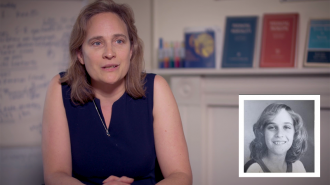
- Our studies
- Our research
- Publications and resources
- Data access and training
- About
- News
- Events
- Get in touch
- Join our mailing list

Welcome to our news and blogs section. Here you’ll find the latest developments and insights from across our longitudinal studies.
Young people from more deprived neighbourhoods have to wait up to 15 minutes longer for accident and emergency (A&E) treatment than their more advantaged peers with similar healthcare needs, according to new findings from Next Steps.
Congratulations to Dr Bozena Wielgoszewska, CLS Research Associate, on being awarded a UK Data Service Data Impact fellowship for developing innovative approaches to research impact.

New datasets have just been released linking education data, including GCSE exam results, to the records of Millennium Cohort Study (MCS) participants based in England.

CLS will present its latest research on survey methods at the European Survey Research Association (ESRA) conference this week (15-19 July 2019).
Congratulations to Professor Gabriella Conti, Co-Investigator of the National Child Development Study, on receiving the Nick Hales Award.

People who are obese from childhood through to middle age have more than double the risk of experiencing difficulties with everyday tasks at age 50 compared to those who were never obese.

Children who experience a family break-up are more likely to become overweight or obese than those living with both parents, according to a new study.

With the 7-Up children returning to our TV screens this week at age 63 (4 June), Professor Alissa Goodman reflects on the importance of the show and the longitudinal studies she manages at CLS.

Children who play and listen to music, draw and paint, and read for pleasure tend to have higher levels of self-esteem, new research shows.

Being born early is no barrier to children and adolescents participating in organised sports and playing with friends, according to new research.

Young people of all academic abilities are more likely to fare better in their GCSE exams if they have confidence in their school work, new research shows.

Is screen time really behind the rise in teenage mental health problems? How is the ‘sandwich generation’ faring as they care for their ageing parents and their children and grandchildren? Researchers have been using CLS study data to tackle these and other key questions.

Children who get on with their peers are more able to cope with stressful events in mid-life, new findings show.
Ryan Bradshaw
Senior Communications Officer
Phone: 020 7612 6516
Email: r.bradshaw@ucl.ac.uk